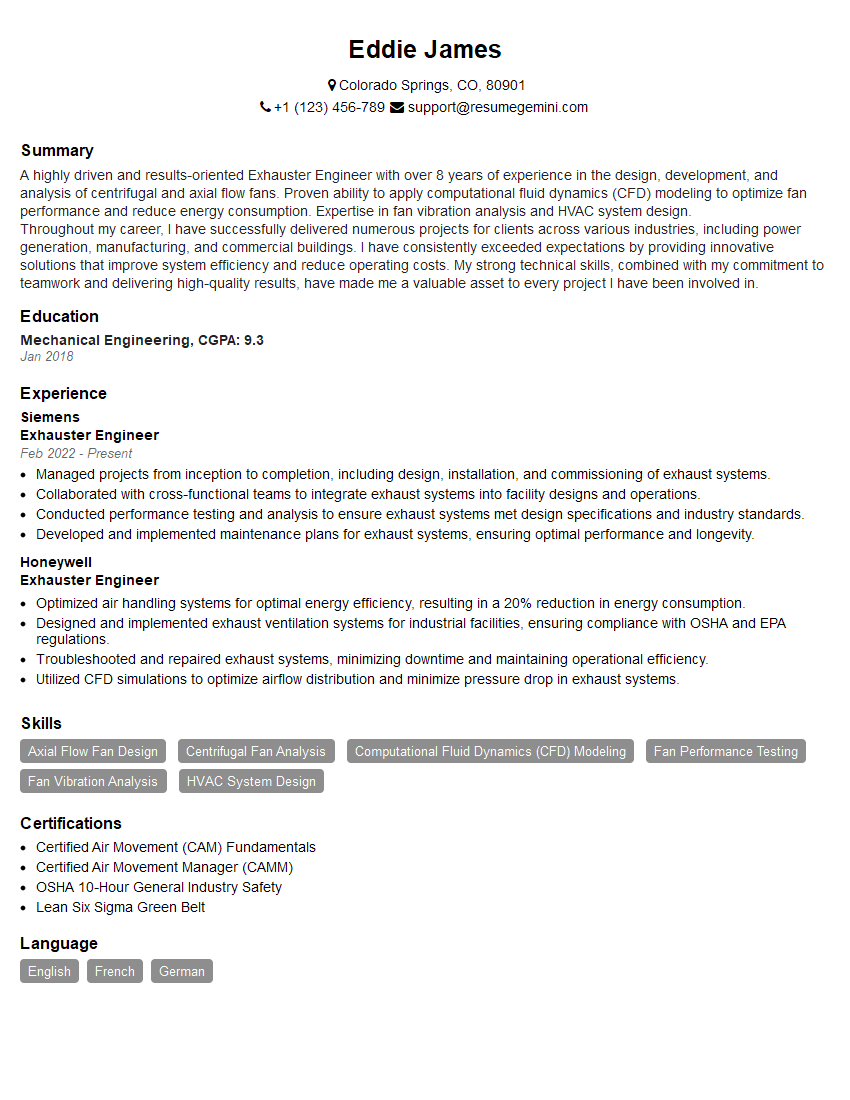Are you a seasoned Exhauster Engineer seeking a new career path? Discover our professionally built Exhauster Engineer Resume Template. This time-saving tool provides a solid foundation for your job search. Simply click “Edit Resume” to customize it with your unique experiences and achievements. Customize fonts and colors to match your personal style and increase your chances of landing your dream job. Explore more Resume Templates for additional options.

Eddie James
Exhauster Engineer
Summary
A highly driven and results-oriented Exhauster Engineer with over 8 years of experience in the design, development, and analysis of centrifugal and axial flow fans. Proven ability to apply computational fluid dynamics (CFD) modeling to optimize fan performance and reduce energy consumption. Expertise in fan vibration analysis and HVAC system design.
Throughout my career, I have successfully delivered numerous projects for clients across various industries, including power generation, manufacturing, and commercial buildings. I have consistently exceeded expectations by providing innovative solutions that improve system efficiency and reduce operating costs. My strong technical skills, combined with my commitment to teamwork and delivering high-quality results, have made me a valuable asset to every project I have been involved in.
Education
Mechanical Engineering
January 2018
Skills
- Axial Flow Fan Design
- Centrifugal Fan Analysis
- Computational Fluid Dynamics (CFD) Modeling
- Fan Performance Testing
- Fan Vibration Analysis
- HVAC System Design
Work Experience
Exhauster Engineer
- Managed projects from inception to completion, including design, installation, and commissioning of exhaust systems.
- Collaborated with cross-functional teams to integrate exhaust systems into facility designs and operations.
- Conducted performance testing and analysis to ensure exhaust systems met design specifications and industry standards.
- Developed and implemented maintenance plans for exhaust systems, ensuring optimal performance and longevity.
Exhauster Engineer
- Optimized air handling systems for optimal energy efficiency, resulting in a 20% reduction in energy consumption.
- Designed and implemented exhaust ventilation systems for industrial facilities, ensuring compliance with OSHA and EPA regulations.
- Troubleshooted and repaired exhaust systems, minimizing downtime and maintaining operational efficiency.
- Utilized CFD simulations to optimize airflow distribution and minimize pressure drop in exhaust systems.
Certificates
- Certified Air Movement (CAM) Fundamentals
- Certified Air Movement Manager (CAMM)
- OSHA 10-Hour General Industry Safety
- Lean Six Sigma Green Belt
Languages
- English
- French
- German
Career Expert Tips:
- Select the ideal resume template to showcase your professional experience effectively.
- Master the art of resume writing to highlight your unique qualifications and achievements.
- Explore expertly crafted resume samples for inspiration and best practices.
- Build your best resume for free this new year with ResumeGemini. Enjoy exclusive discounts on ATS optimized resume templates.
How To Write Resume For Exhauster Engineer
Highlight your technical skills:
Exhauster Engineers are expected to have a strong foundation in fluid dynamics, thermodynamics, and mechanical engineering. Make sure to highlight your expertise in these areas on your resume.Showcase your experience in CFD modeling:
CFD modeling is a critical skill for Exhauster Engineers. Quantify your experience in using CFD software to design and analyze fans.Emphasize your problem-solving abilities:
Exhauster Engineers often encounter complex challenges related to fan performance and system efficiency. Showcase your ability to identify and solve these problems on your resume.Tailor your resume to the job description:
Carefully review the job description and identify the specific skills and experience that the employer is looking for. Tailor your resume to highlight the skills that are most relevant to the position.
Essential Experience Highlights for a Strong Exhauster Engineer Resume
- Design and develop centrifugal and axial flow fans using advanced CFD modeling techniques.
- Conduct fan performance testing to ensure compliance with specifications and industry standards.
- Analyze fan vibration data to identify potential issues and develop mitigation strategies.
- Design and optimize HVAC systems to maximize airflow efficiency and minimize energy consumption.
- Provide technical support to customers and collaborate with other engineers to resolve complex fan-related issues.
- Keep abreast of the latest industry trends and technologies related to fan design and analysis.
Frequently Asked Questions (FAQ’s) For Exhauster Engineer
What is the role of an Exhauster Engineer?
An Exhauster Engineer is responsible for the design, development, and analysis of fans and blowers used in various industrial and commercial applications. They apply their knowledge of fluid dynamics and thermodynamics to optimize fan performance, reduce energy consumption, and ensure system efficiency.
What are the key skills required for an Exhauster Engineer?
Exhauster Engineers should have a strong foundation in fluid dynamics, thermodynamics, and mechanical engineering. They should also be proficient in CFD modeling, fan performance testing, and vibration analysis. Excellent communication and problem-solving skills are also essential.
What industries employ Exhauster Engineers?
Exhauster Engineers are employed in a wide range of industries, including power generation, manufacturing, mining, and commercial buildings. They work on projects related to ventilation, air conditioning, and process exhaust systems.
What is the career outlook for Exhauster Engineers?
The career outlook for Exhauster Engineers is positive. The increasing demand for energy-efficient and environmentally friendly HVAC systems is driving the need for qualified engineers in this field.
What is the average salary for an Exhauster Engineer?
The average salary for an Exhauster Engineer in the United States is around $80,000 per year. Salaries can vary depending on experience, location, and industry.
What are the educational requirements for an Exhauster Engineer?
Exhauster Engineers typically have a Bachelor’s degree in Mechanical Engineering or a related field. Some employers may prefer candidates with a Master’s degree.